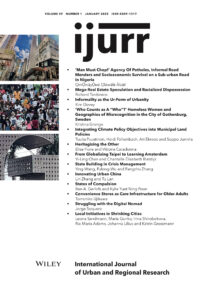This article examines the transformation of urban referencing in Taipei City after democratization, using policy mobility theories and case study research methods to ‘follow policy changes’ over three decades. It argues that geopolitical considerations in the 1990s prompted Taipei to adopt the global city discourse as a political strategy, subsequently leading to the implementation of neoliberal urban policies. These policies encouraged property-led development and housing speculation, exacerbating housing affordability issues. Amidst these challenges, a progressive bottom-up social housing movement emerged in 2010, drawing inspiration from the Dutch model. However, this process of policy mobility is selective, with Amsterdam serving more as an inspirational benchmark than a direct model for replication. Neoliberalism hinders both Dutch and Taiwanese social housing policies from achieving housing justice. This case study of Taiwan’s post-democratization urban development will also contribute to the literature on urban developmentalism.
Details
Written by:
Yi-Ling Chen, Chantalle Elisabeth Rietdijk
Digital Object Identifier (DOI)
https://doi.org/10.1111/1468-2427.13291
About DOI

